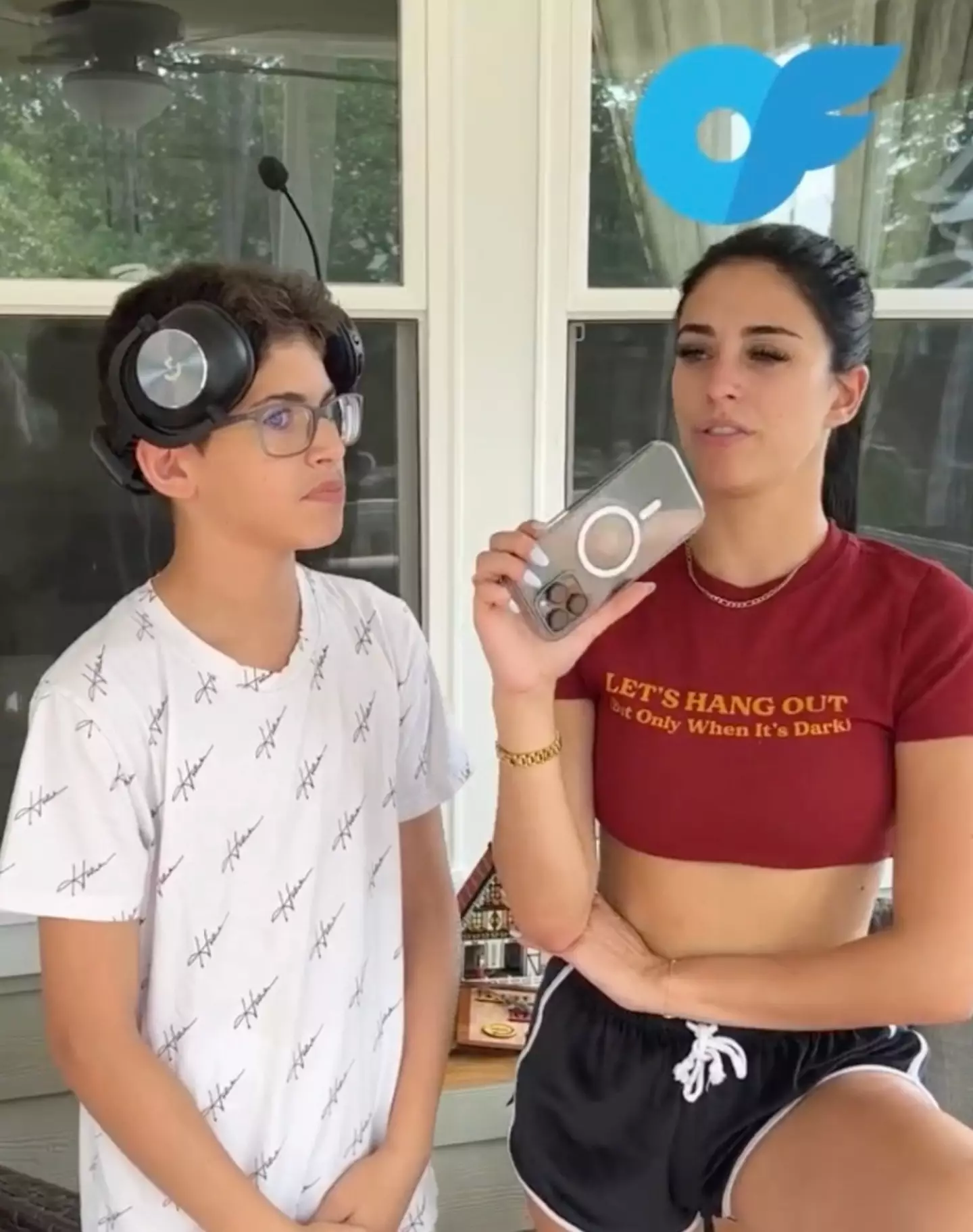Camilla Araujo Leaked OnlyFans: Understanding The Controversy And Its Implications
Alright, let's dive right into this heated topic that's got everyone talking. Camilla Araujo leaked OnlyFans has been making waves across the internet, sparking debates, controversies, and a whole lot of curiosity. Whether you're here for the drama, the gossip, or the facts, we’ve got you covered. This isn’t just about a leak; it’s about understanding the bigger picture, the implications, and what it means for digital privacy in today's world. So, grab your popcorn and let’s get started.
Now, if you're scratching your head wondering who Camilla Araujo is, don’t worry—you're not alone. Camilla Araujo is an internet sensation who gained traction through her work on OnlyFans, a subscription-based platform where creators share exclusive content. But recently, her private content has been leaked, and that’s where things got messy. This isn’t just a story of one person—it’s a reflection of how our digital world handles privacy, consent, and respect for personal boundaries.
Before we go deeper, let’s set the tone. This article aims to educate, inform, and spark meaningful conversations. We’ll explore the controversy surrounding Camilla Araujo’s leaked content, the legal and ethical implications, and why this matters to all of us. So, whether you're a fan, a critic, or just someone looking to understand the bigger picture, stick around.
- 300mb Movies Hub Your Ultimate Guide To Movie Downloads And Entertainment
- Hdmovies2in Your Ultimate Destination For Highquality Movies Online
Who is Camilla Araujo?
Let’s take a step back and get to know the person behind the headlines. Camilla Araujo isn’t just another name on the internet; she’s a creator who built her reputation through hard work, creativity, and authenticity. For those unfamiliar with her journey, here’s a quick rundown:
Camilla Araujo is a Brazilian model and content creator who rose to fame through her work on OnlyFans. Her content primarily focuses on fitness, lifestyle, and modeling, attracting a massive fan base. Known for her captivating presence and dedication to her craft, Camilla has carved out a niche for herself in the digital content space.
But what happens when someone’s private content gets leaked without their consent? That’s exactly what we’ll explore next.
- Unveiling The Power Of Mydasi Net Revolutionizing Connectivity
- Movie Rulez2 Com 2024 Your Ultimate Guide To Stream Movies Safely And Legally
The Leak: What Happened?
So, here’s the deal. The Camilla Araujo leaked OnlyFans incident isn’t just another random leak. It’s a breach of trust, a violation of privacy, and a stark reminder of how fragile digital security can be. The leaked content, which was supposed to be exclusive to her subscribers, found its way onto various platforms, sparking outrage and raising important questions about accountability.
How did it happen? While the exact details are still murky, leaks like these often stem from hacking, unauthorized access, or even insider breaches. What’s alarming is that these incidents are becoming increasingly common, and creators are left vulnerable in a world where their digital assets are their bread and butter.
Why Does This Matter?
This isn’t just about Camilla Araujo. It’s about every creator who relies on platforms like OnlyFans to make a living. When private content is leaked, it’s not just a loss of income—it’s a violation of personal boundaries and a breach of trust. Creators put their time, effort, and creativity into producing content, and when that content is shared without permission, it undermines their work and their dignity.
Understanding the Controversy
The controversy surrounding the Camilla Araujo leaked OnlyFans incident goes beyond the surface. It’s about the ethics of sharing private content, the legality of such actions, and the societal norms that govern digital behavior. Here’s a breakdown of the key issues:
- Consent: At its core, this is an issue of consent. Creators like Camilla share their content with specific audiences for a fee. Sharing that content without their permission is a violation of their rights.
- Privacy: In a world where everything is online, how do we protect our privacy? This incident highlights the vulnerabilities of digital platforms and the need for stronger security measures.
- Legal Implications: Leaking private content without consent can have serious legal consequences. We’ll dive deeper into this in the next section.
What Are the Legal Ramifications?
Leaking private content without consent isn’t just unethical—it’s illegal. Depending on the jurisdiction, those responsible for the leak could face charges related to copyright infringement, invasion of privacy, and even cybercrime. The laws surrounding digital content are evolving, but one thing is clear: creators have the right to control how their content is used and shared.
Exploring the Ethical Dimensions
Beyond the legal aspects, there’s an ethical dimension to this controversy. Sharing private content without consent raises questions about respect, empathy, and accountability. In a world where digital interactions often lack face-to-face connections, it’s easy to forget the human element behind the content. This incident serves as a wake-up call for all of us to rethink how we engage with digital content and the people behind it.
How Can We Promote Ethical Digital Behavior?
Here are a few ways we can foster a more ethical digital environment:
- Respect Consent: Always seek permission before sharing someone else’s content.
- Support Creators: If you enjoy someone’s work, support them through legitimate channels like subscriptions or purchases.
- Spread Awareness: Educate others about the importance of respecting digital boundaries and the rights of creators.
The Broader Implications
The Camilla Araujo leaked OnlyFans incident isn’t just a standalone event—it’s part of a larger trend. As more creators turn to platforms like OnlyFans to monetize their content, the risks of leaks and breaches increase. This highlights the need for stronger security measures, better legal protections, and a shift in societal attitudes toward digital content.
What Can Platforms Do?
Platforms like OnlyFans have a responsibility to protect their creators. Here are a few steps they can take:
- Enhance Security: Implement advanced encryption and authentication protocols to prevent unauthorized access.
- Provide Legal Support: Offer resources and guidance to creators who experience breaches or leaks.
- Engage with Creators: Listen to feedback from creators and work collaboratively to improve platform safety.
How Can Creators Protect Themselves?
While platforms have a role to play, creators can also take steps to protect their content and their privacy. Here are a few tips:
- Use Strong Passwords: Ensure your accounts are secured with complex passwords and two-factor authentication.
- Limit Distribution: Be cautious about who has access to your content and where it’s shared.
- Stay Informed: Keep up with the latest trends and technologies in digital security.
Public Reaction and Social Media
As with any major controversy, social media has played a significant role in shaping public opinion. The reaction to the Camilla Araujo leaked OnlyFans incident has been mixed, with some condemning the leak while others exploit it for their own gain. This highlights the power of social media in amplifying both positive and negative narratives.
How Can We Be Better Digital Citizens?
Being a responsible digital citizen means being mindful of how we engage with content and with each other online. Here are a few tips:
- Verify Information: Before sharing or reacting to a story, ensure it’s credible and accurate.
- Practice Empathy: Remember that there’s a real person behind every piece of content.
- Support Ethical Behavior: Encourage others to act with integrity and respect online.
Looking Ahead: What’s Next?
As the dust settles on the Camilla Araujo leaked OnlyFans incident, it’s clear that this is a turning point for digital content creators. The conversation around privacy, consent, and digital rights is gaining momentum, and it’s up to all of us to shape its future. Whether you’re a creator, a consumer, or just someone who cares about digital ethics, this is a moment to reflect, learn, and take action.
What Can You Do?
Here’s how you can contribute to a better digital future:
- Support Creators: Show your appreciation by supporting them through legitimate channels.
- Spread Awareness: Share this article and other resources to educate others about the importance of digital ethics.
- Stay Informed: Keep learning about the latest developments in digital security and privacy.
Conclusion
The Camilla Araujo leaked OnlyFans incident is more than just a scandal—it’s a wake-up call for all of us. It highlights the vulnerabilities of our digital world and the need for stronger protections for creators and their content. As we move forward, let’s commit to fostering a digital environment that respects privacy, promotes consent, and values the rights of creators.
So, what’s your take on this? Share your thoughts in the comments below, and don’t forget to spread the word. Together, we can make a difference!
Table of Contents
Article Recommendations
- Adult Sexy Movie A Comprehensive Guide To Understanding The Industry
- Hd Sexy Videos A Guide To Ethical Enjoyment And Safety



Detail Author:
- Name : Bret White
- Username : chandler.botsford
- Email : moen.nigel@upton.com
- Birthdate : 1972-10-22
- Address : 4950 Arjun Coves Apt. 543 South Madisen, OH 69952-3312
- Phone : 520-658-0966
- Company : Heller-Langworth
- Job : Construction
- Bio : Saepe quis eius nihil neque et tempore. Ut perferendis voluptas aut porro non aspernatur. Voluptatum tempora minima eum consequuntur.
Socials
facebook:
- url : https://facebook.com/feeney1995
- username : feeney1995
- bio : In iusto ab quaerat porro quaerat recusandae magnam.
- followers : 1199
- following : 548
tiktok:
- url : https://tiktok.com/@vfeeney
- username : vfeeney
- bio : Cumque nostrum sunt maiores. Possimus expedita deserunt ab.
- followers : 2710
- following : 199
twitter:
- url : https://twitter.com/verda_feeney
- username : verda_feeney
- bio : Fuga ut vel ipsum pariatur. Consequuntur voluptate earum voluptatem assumenda. Voluptas dolores iste quia incidunt voluptatem ipsa occaecati.
- followers : 3765
- following : 914